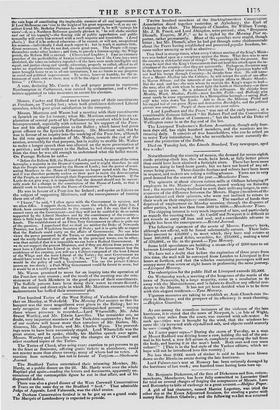Messrs. Cooke. and Holland met a large party of their
constituents at Pershore, on Tuesday last ; when both gentlemen delivered Liberal speeches, which gave great satisfaction to the company.
Messrs. Morrison and Wason had a meeting with their constituents at Ipswich on the 1st instant ; when Mr. Morrison entered into an ex- planation of several parts of his Parliamentary conduct which bad been misrepresented, especially with reference to his support of the Poor- law and his alleged opposition to the Ballot ; which latter had given great offence to the Ipswich Reformers. Mr. Morrison said, flint he was in favour of an inquiry into the working of the Poor-law, although he did vote against a motion of Mr. Walter, towards the end of the session, ostensibly for that purpose, but in reality to enable Mr. Walter to make a longer speech than was allowed on the mere presentation of a petition ; and with respect to the Ballot, he had always supported it from the time he was old enough to understand what the ballot meant. On Peerage Reform he said- " Before the Reform Bill, the House of Lords possessed, by means of the rotten boroughs, a majority in the House of Commons, and it might therefore be said that the People were governed by the House of Lords ; but the power of nomi- nating Members in the House of Commons no longer rested with the Peers, and it was therefore perfectly useless on their part to resist the determination of the People, as expressed through their Representatives in Parliament. If the Lords do not give way, it is impossible that the demand should not be univer- sally made fur a change in the constitution of the House of Lords, so that it should work in harmony with the House of Commons."
He was in favour of a Poor-law for Ireland ; and spoke as follows on the subject of supporting Ministers, and the consequences of turning them out of office.
" I know," he said, " I often agree with the Government in opinion, and we often differ. I support them, because, upon the whole, their policy has, I think, been eminently serviceable to the country; and I do say; that if they cannot carry on the Government—and they will not be enabled to do so unless supported by the Liberal Members and by the constituency of the country— there is little hope for the sort of Reform which you desire to receive at their hands. The establishment of an Ultra-Tory Government in office is quite out of the question. I apprehend that we shall see neither the Duke of Newcastle Premier, nor Lord Winchilsea Secretary of State ; and it is quite idle to expect that the Radicals could carry on the affairs of Government. No one who views the power possessed by the Tories, or contemplates the recent elections and the nicely-balanced state of parties in the principal towns, can be other- wise than satisfied that it is impossible we can have a Radical Government. If we do not support the present Ministers, and if they are driven from power, we must have a Cabinet less Liberal in their place. If the Government lose the confidence of the country, you will see a Cabinet composed of the least Liberal of the Whigs and the most Liberal of the Tories; the next Government we should have would be a Peel-Whig. (" No, no! ") You may judge of what would be the policy of such a Government. You say the present Cabinet moves on too slowly ; a Peel-Whig Government would be forced to move, but it would be at a snail's pace indeed."
Mr. Wason promised to move for an inquiry into the operation of the Poor-law next session ; and the result of the meeting was the rein- statement of both Members in the good graces of their constituents.
The Suffolk parsons have been doing their worst to create discord ; but the manly and direct style in which Mr. Morrison encountered the nudecontents has baffled their reverences' plot.


























 Previous page
Previous page